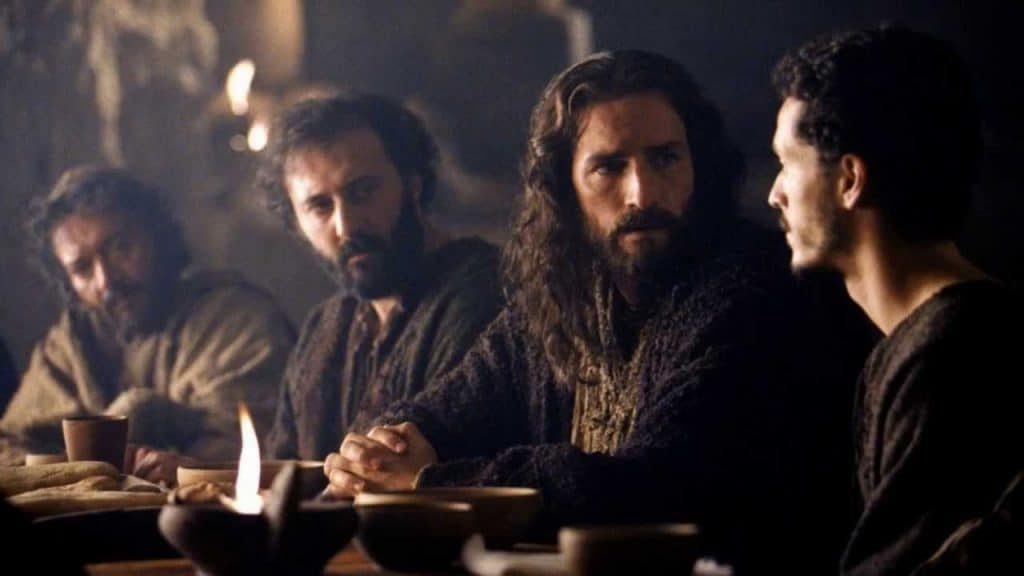Good Friday invites Christians around the globe to remember the death of Jesus Christ, who arrived in Jerusalem on Palm Sunday a celebrated hero and was hung on a cross five days later.
It is hard for me to write about Good Friday. I want to skip the darkness, the pain, the injustice, and the suffering and springboard into Easter Sunday, where all is light. But I know that the glory of grace and the reality of our salvation is made most clear in contrast to the darkness. Just as during Advent, we wait in hope and anticipation for the coming of the Light, on Good Friday, we must remember the crucifixion of God Incarnate, the death of God’s Son, before we can celebrate God’s gift of eternal life.
The Passion of the Christ: What to Expect
The Passion of the Christ (2004) © 20th Century Studios. Image Courtesy of IMDb.
The events of Good Friday began late Thursday evening, after a meal in the Upper Room with all of Jesus’ disciples, and concluded some 15 hours later, Friday afternoon, when Jesus was hung on a cross and died. Mercifully, The Passion of the Christ, produced and directed by Mel Gibson, summarizes those 15 hours into a two-hour film.
Every single minute is excruciating to watch.
If you have read the Gospel accounts of Jesus’ death, it’s easy to gloss over beatings, whippings, piercings, tears of despair, sweating blood, crying out to God, and crucifixion. It’s easy to read these sentences as just a pile of words that lead to more words about resurrection. But to watch those same words reenacted as if you were there… it’s enough to make you tremble and sob, which is what I did the entire time I watched The Passion of the Christ in 2004 in theaters.
It didn’t get any easier 18 years later. Watching The Passion of the Christ puts beaten and bloody flesh onto the Gospel story of Jesus’ death. It is hard and horrible to watch, rated R for good reason, forcing its viewers to see the suffering Savior bear pain and abuse from the powers of the age and common people, without resistance, in the name of Love, because he called himself God.
Jesus’ only response to his abusers? “Father, forgive them, for they do not know what they are doing” (Luke 23:34 NIV).
Finding the Love: Faithifying Your Viewing
The 15 hours of Jesus’ life covered in The Passion of the Christ are prefaced off-screen by three years of Jesus daily ministering to people, teaching the disciples, feeding the hungry, healing the sick, casting out demons, touching people who were considered untouchable, restoring fallen women, inviting children into his arms, turning water to wine, and giving sight to the blind.
It wasn’t his goodness that got him into trouble; it was that he broke the rules of his religion, he threatened the powerful with his powerful love, his gentle spirit, his extravagant grace and otherworldly compassion. “By what power do you do these things?” the religious leaders asked.
When Jesus answered their accusations and asked them to look at his works to determine from where he came, the religious leaders couldn’t take it.
Blasphemy! They shouted. You can’t talk about God like that, like God somehow gave you power to heal, to save, to feed, to feel, to love. Jesus was a threat to their world’s order. His love and his proclamation that this Light and Love was the Way, the Truth, and the Light didn’t leave space for fear, and fear is the religious leaders’ and the political leaders’ greatest weapon to gain control of the world.
But Jesus told his disciples, “I have told you these things, so that in me you may have peace. In this world you will have trouble. But take heart! I have overcome the world” (John 16:32-33 NIV).
So they arrested him, under the cover of night, and all his disciples fled, and everyone cowered as the Son of Man was whipped and mocked and forced to carry his own cross.
Here is humanity in all its powerful depravity—mocking, beating, whipping, and torturing a man for calling Himself God, for daring to differ from the religious leaders’ idea of God, for leading with love instead of judgment. It was too much, this Love, too revolutionary, too subversive, too dramatic of a turned table. So they took pleasure in his pain and suffering, unto death.
God, the main subject of the Greatest Commandment—Love the Lord your God with all your heart, soul, and strength—they splayed God and pinned Him to two planks of wood to die a criminal’s death.
Lots of men were crucified by the Romans. It was a common form of corporal punishment, intended to put fear into the hearts of anyone who might try to defy the Roman government. “In this world you will have trouble,” Jesus told his disciples.
If it had been the end of the story, then history would never have remembered Jesus of Nazareth.
“But take heart! I have overcome the world.”
Thank God that isn’t the end of the story.
“The true light that gives light to everyone was coming into the world. He was in the world, and though the world was made through him, the world did not recognize him. He came to that which was his own, but his own did not receive him. Yet to all who did receive him, to those who believed in his name, he gave the right to become children of God—children born not of natural descent, nor of human decision or a husband’s will, but born of God. The Word became flesh and made his dwelling among us. We have seen his glory, the glory of the one and only Son, who came from the Father, full of grace and truth” (John 1:9-14 NIV).





 Copyright
2024
Root and Vine
Copyright
2024
Root and Vine